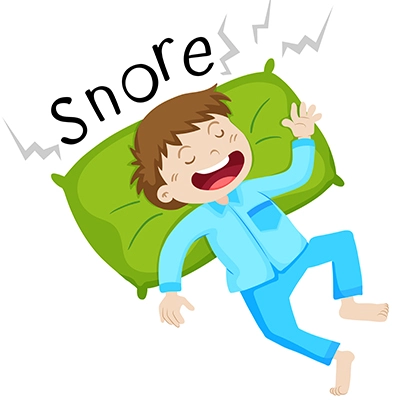Snoring: is a common physiological phenomenon characterized by the production of loud, vibrating sounds during sleep, typically caused by the partial obstruction or narrowing of the airway passages in the throat or nose. These sounds occur when the flow of air through the airway encounters resistance, leading to the soft tissues (such as the uvula and the soft palate) in the throat and the back of the mouth to vibrate as a person breathes. Snoring can vary in intensity, from mild and occasional to loud and chronic, and it can disrupt the quality of sleep for both the snorer and their bed partner. Snoring is a prevalent issue and is often associated with various factors, including sleep position, obesity, alcohol consumption, and underlying medical conditions like sleep apnea.
Types of Snoring
Snoring can be categorized into different types based on various factors and characteristics.
Here are some common types of snoring:
- Primary Snoring: This is the most common type of snoring and is not associated with any underlying medical condition like sleep apnea. It occurs when the airflow is partially obstructed during sleep, causing the soft tissues in the throat to vibrate, resulting in snoring sounds. Primary snoring is often considered benign and not as severe as other types.
- Sleep Apnea-Related Snoring: Snoring can be a symptom of obstructive sleep apnea (OSA), a serious sleep disorder. In OSA, the airway becomes completely or partially blocked during sleep, leading to episodes of interrupted breathing. Snoring in OSA tends to be louder and more irregular than primary snoring, and it is often accompanied by choking or gasping sounds as the individual briefly wakes up to resume normal breathing.
- Positional Snoring: Some people primarily snore when sleeping in specific positions, such as on their back. This is known as positional snoring. It occurs because certain sleeping positions can cause the tongue and soft palate to collapse to a greater extent, narrowing the airway and increasing the likelihood of snoring.
- Nasal Snoring: Nasal congestion or blockages can lead to snoring. When the airflow through the nose is hindered, individuals may compensate by breathing through their mouth, which can contribute to snoring. Conditions like allergies, deviated septum, or sinus problems can lead to nasal snoring.
- Palatal Flutter: In some cases, snoring sounds are produced by the vibration of the soft palate alone, without the involvement of the throat tissues or tongue. This type of snoring is often referred to as palatal flutter and may have different characteristics from traditional snoring.
- Tongue-Based Snoring: If the snoring sounds are primarily generated by the tongue partially blocking the airway, it is known as tongue-based snoring. This type of snoring may be more common in individuals with certain anatomical features or muscle tone issues.
- Mixed Snoring: Many individuals exhibit a combination of different types of snoring. For example, they may have primary snoring when sleeping on their side but positional or tongue-based snoring when on their back.
- Social Snoring: While not a distinct type of snoring in a medical sense, social snoring refers to the snoring that affects a bed partner or others in the same sleeping environment. It can vary in intensity and can be disruptive to the sleep of those nearby.
It’s important to note that snoring may vary in severity and underlying causes among individuals. Persistent and loud snoring, especially if accompanied by other symptoms like excessive daytime sleepiness or witnessed breathing pauses, should be evaluated by a healthcare professional to rule out any underlying sleep disorders like sleep apnea and to determine the most appropriate treatment options.
Symptoms of Snoring
Snoring itself is a symptom, but it can also be accompanied by various other symptoms or issues, especially when it is associated with an underlying sleep disorder like obstructive sleep apnea (OSA).
Here are some common symptoms and issues that may be associated with snoring:
- Loud and Disruptive Noises: The most obvious symptom of snoring is the loud and often disruptive noise produced during sleep. The intensity and frequency of snoring can vary from person to person.
- Daytime Fatigue: Snoring can disrupt the quality of sleep for both the snorer and their bed partner. As a result, snorers may experience daytime fatigue, drowsiness, and reduced alertness, which can impact their daily activities and productivity.
- Morning Headaches: Some individuals who snore may wake up with headaches, especially if their snoring is related to sleep apnea. This can be a result of reduced oxygen levels during sleep apnea episodes.
- Dry Mouth and Sore Throat: Snoring can lead to breathing through the mouth, which can cause dry mouth and a sore throat upon waking up.
- Restless Sleep: Snoring can disrupt the sleep cycle, leading to frequent awakenings during the night. Snorers may have difficulty achieving deep, restful sleep.
- Difficulty Concentrating: Due to poor sleep quality, individuals who snore may experience difficulty concentrating, memory problems, and decreased cognitive function.
- Irritability: Sleep disruption caused by snoring can lead to irritability and mood swings. Snorers and their bed partners may experience increased stress due to the disruptive nature of snoring.
- High Blood Pressure: Long-term snoring, particularly when associated with sleep apnea, can contribute to elevated blood pressure, increasing the risk of hypertension and cardiovascular problems.
- Witnessed Pauses in Breathing: In cases of sleep apnea, bed partners or family members may witness the snorer briefly stop breathing during sleep, followed by a gasp or choking sound as breathing resumes.
- Frequent Nighttime Urination: Some individuals with sleep apnea may wake up frequently during the night to urinate (nocturia). This can be related to the increased production of certain hormones due to sleep disturbances.
- Weight Gain: There is a bidirectional relationship between snoring and obesity. Snoring can contribute to weight gain, and excess body weight can exacerbate snoring by increasing fat deposits in the throat area.
It’s important to note that not everyone who snores will experience these symptoms, and the severity of symptoms can vary widely. If snoring is severe, persistent, or associated with other concerning symptoms such as witnessed breathing pauses, it should be evaluated by a healthcare professional. Snoring that is related to an underlying sleep disorder like sleep apnea may require medical intervention and treatment to improve both the snorer’s and their bed partner’s quality of sleep and overall health.

Causes of Snoring
Snoring is typically caused by the vibration of the soft tissues in the throat and the back of the mouth when airflow through the airway becomes partially obstructed during sleep.
Several factors and underlying causes can contribute to snoring:
- Anatomy: The physical structure of a person’s throat and mouth can play a significant role in snoring. Factors such as a narrow airway, a low, thick soft palate, enlarged tonsils or adenoids, and an elongated uvula can increase the likelihood of snoring.
- Sleep Position: Sleeping on your back can lead to snoring in some individuals. This position may cause the tongue and soft palate to collapse to a greater extent, narrowing the airway and increasing the likelihood of snoring.
- Obesity: Excess body weight, especially around the neck, can lead to the accumulation of fatty tissues in the throat area. This extra tissue can narrow the airway and increase the risk of snoring.
- Age: As people age, the muscle tone in the throat naturally decreases. This can result in a relaxation of the throat muscles during sleep, making snoring more likely.
- Alcohol and Sedatives: The use of alcohol, sedatives, or muscle relaxants can relax the muscles in the throat, leading to increased snoring.
- Nasal Congestion: Conditions that cause nasal congestion or blockages, such as allergies, sinus infections, or a deviated septum, can force individuals to breathe through their mouths, increasing the likelihood of snoring.
- Sleep Positional Factors: In some cases, snoring is primarily positional. People who snore more when sleeping on their back may experience relief by changing their sleep position.
- Smoking: Smoking irritates and inflames the throat and airway tissues, making snoring more likely.
- Sleep Apnea: Snoring can be a symptom of obstructive sleep apnea (OSA), a serious sleep disorder. OSA occurs when the airway becomes completely or partially blocked during sleep, leading to interrupted breathing and potentially severe snoring.
- Medications: Certain medications, including antihistamines and sleeping pills, can relax the throat muscles and contribute to snoring.
- Pregnancy: Some pregnant women may experience snoring due to hormonal changes and weight gain.
- Family History: Genetic factors can influence the likelihood of snoring. If your parents or siblings snore, you may be more prone to snoring as well.
- Sleep Deprivation: Not getting enough quality sleep can lead to muscle relaxation and increased likelihood of snoring.
It’s important to note that snoring can vary in intensity and may have multiple contributing factors in individual cases. In some instances, snoring may be harmless and easily addressed with lifestyle changes, while in others, it may be a sign of an underlying medical condition like sleep apnea that requires medical evaluation and treatment. If snoring is severe, persistent, or accompanied by other concerning symptoms, it’s advisable to consult a healthcare professional for a proper assessment and appropriate management.
Home Remedies of Snoring
There are several home remedies and lifestyle changes that may help reduce or alleviate snoring. Keep in mind that the effectiveness of these remedies can vary from person to person, and they may work best for individuals with mild to moderate snoring. If snoring persists or is associated with an underlying sleep disorder like sleep apnea, it’s essential to consult a healthcare professional for a proper diagnosis and treatment.
Here are some home remedies to consider:
- Change Sleep Position:
– Sleeping on your side rather than your back can often reduce snoring. You can use body pillows or other aids to help maintain a side-sleeping position. - Elevate Your Head:
– Elevating the head of your bed by a few inches can help keep your airway open. You can do this by using a wedge pillow or by placing blocks under the head of your mattress. - Lose Weight:
– If you are overweight or obese, losing weight can reduce the amount of fatty tissue in your throat, which can contribute to snoring. - Avoid Alcohol and Sedatives:
– Alcohol and sedatives relax the muscles in the throat, increasing the likelihood of snoring. Try to avoid consuming these substances, especially in the evening. - Stay Hydrated:
– Staying well-hydrated can help prevent the sticky secretions in your throat and nose that can contribute to snoring. Aim to drink plenty of water throughout the day. - Practice Good Sleep Hygiene:
– Establish a regular sleep schedule and create a comfortable sleep environment. Ensure that your bedroom is dark, quiet, and at a comfortable temperature. - Nasal Strips or Nasal Dilators:
– Over-the-counter nasal strips or nasal dilators can help improve airflow through the nostrils, reducing snoring caused by nasal congestion or blockages. - Treat Nasal Congestion:
– If you have allergies or sinus issues, consider using saline nasal sprays, humidifiers, or allergy medications to alleviate congestion. - Throat Exercises:
– Strengthening the muscles in your throat and tongue through specific exercises may help reduce snoring. Singing, playing certain musical instruments, and practicing oral exercises can be beneficial. - Avoid Heavy Meals Before Bed:
– Eating a large, heavy meal shortly before bedtime can lead to snoring. Try to have your last meal at least two to three hours before going to sleep. - Sleep on a Comfortable Pillow:
– Make sure your pillow is comfortable and provides adequate support for your head and neck. An improperly positioned pillow can contribute to snoring. - Maintain a Clean Bedroom:
– Dust and allergens in your bedroom can exacerbate snoring if you have allergies. Regularly clean and dust your bedroom to reduce potential allergen exposure. - Limit Tobacco Smoke Exposure:
– If you smoke, consider quitting, as smoking irritates and inflames the throat and airway tissues. Also, avoid exposure to secondhand smoke. - Use an Anti-Snoring Device:
– There are various anti-snoring devices available over the counter, such as mouthpieces, chin straps, and tongue stabilizing devices. These devices aim to help keep the airway open during sleep.
It’s important to be patient and consistent when trying these home remedies, as it may take time to see results. If snoring persists despite these efforts or is associated with other concerning symptoms like excessive daytime sleepiness or witnessed breathing pauses, seek medical advice from a healthcare professional or a sleep specialist. They can provide a thorough evaluation and recommend appropriate treatment options, which may include medical devices or interventions.

How do I know if I snore?
It’s possible to determine if you snore by taking the following steps:
- Ask a Bed Partner or Family Member: Often, the easiest way to find out if you snore is to ask someone you share a sleeping space with. They are likely to hear your snoring if it occurs.
- Record Yourself: You can use a smartphone or a digital voice recorder to record audio while you sleep. Place the recording device near your bed before going to sleep, and then review the recording in the morning to listen for any snoring sounds.
- Self-observation: Try to pay attention to your own sleep patterns. If you wake up feeling tired despite what you believe to be a full night’s sleep, or if you frequently experience symptoms like a dry mouth or a sore throat upon waking, these can be indicators of snoring.
- Online Sleep Apps and Devices: There are various smartphone apps and wearable sleep tracking devices that can detect and record snoring during the night. These apps and devices use microphones or accelerometers to monitor your sleep and may provide insights into your snoring patterns.
- Consult a Healthcare Professional: If you suspect you snore or if you have been informed by a bed partner that you snore loudly and persistently, it may be a good idea to consult a healthcare professional or a sleep specialist. They can conduct a thorough evaluation, including a sleep study if necessary, to diagnose any underlying sleep disorders like sleep apnea, which is often associated with loud snoring.
Remember that snoring is a common occurrence for many people, and it may not always indicate a serious problem. However, if your snoring is loud, persistent, and accompanied by other symptoms such as daytime fatigue, witnessed breathing pauses, or excessive drowsiness, it’s important to seek professional guidance to rule out underlying sleep disorders and explore potential treatment options if needed.
Can stress cause snoring?
Yes, stress can potentially contribute to snoring or worsen existing snoring in some individuals. Stress can affect sleep quality and lead to various physical and physiological changes that increase the likelihood of snoring.
Here’s how stress can be linked to snoring:
- Muscle Tension: Stress can lead to increased muscle tension throughout the body, including in the throat and neck muscles. When these muscles are tense, they are more likely to partially obstruct the airway during sleep, which can result in snoring.
- Poor Sleep Quality: Stress and anxiety can disrupt sleep patterns, causing individuals to have fragmented or shallow sleep. Poor sleep quality can lead to relaxation of the throat muscles and a greater propensity for snoring.
- Weight Gain: Some people may cope with stress by overeating or making unhealthy dietary choices, leading to weight gain. Excess body weight, particularly around the neck, can contribute to snoring by narrowing the airway.
- Alcohol and Smoking: Stress may trigger or exacerbate alcohol consumption and smoking, both of which can relax the muscles in the throat and lead to snoring.
- Sleep Disorders: Chronic stress may increase the risk of developing sleep disorders like insomnia or sleep apnea, both of which can lead to or worsen snoring.
- Nasal Congestion: Stress can weaken the immune system and make individuals more susceptible to illnesses like colds and allergies. Nasal congestion from these conditions can force people to breathe through their mouths, which can increase the likelihood of snoring.
It’s important to note that the relationship between stress and snoring is complex and varies from person to person. Not everyone who experiences stress will necessarily snore, and the severity of snoring can differ among individuals. If stress is contributing to snoring or sleep disturbances, it’s advisable to address the underlying stress through stress-reduction techniques, relaxation exercises, and, if necessary, consultation with a mental health professional.
Additionally, if snoring is persistent, severe, or associated with other concerning symptoms, it’s important to consult a healthcare professional or a sleep specialist for a comprehensive evaluation. They can help determine the underlying causes of snoring and recommend appropriate treatments or interventions to improve sleep quality and overall health.
Iodine Deficiency: Symptoms, Causes, & Home Remedies
Insomnia: Types, Symptoms, Causes & Prevention
Sore Throat, Symptoms, Causes, Prevention & Home Remedies
Dandruff: Types, Symptoms, Causes & Prevention
Dark Circles Under Eyes: Symptoms, Remedies & Prevention
Heart Attack: Types, Symptoms & Prevention
Eye Infections: Symptoms, Causes & Treatment
Vertigo: Causes, Symptoms, Treatment & Preventive
Hair Loss, Types, Symptoms, Prevention & Treatments
Knee Pain, Symptoms, Types & Self Management
If you don’t like this article/post please share your feedback.





